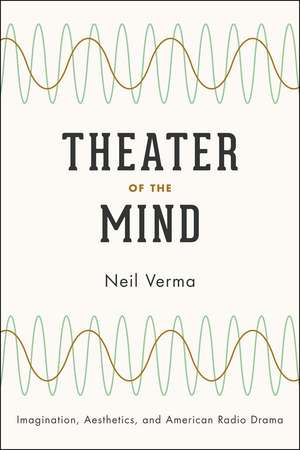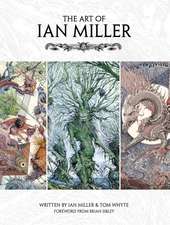Theater of the Mind: Imagination, Aesthetics, and American Radio Drama
Autor Neil Vermaen Limba Engleză Paperback – 11 iul 2012
For generations, fans and critics have characterized classic American radio drama as a “theater of the mind.” This book unpacks that characterization by recasting the radio play as an aesthetic object within its unique historical context. In Theater of the Mind, Neil Verma applies an array of critical methods to more than six thousand recordings to produce a vivid new account of radio drama from the Depression to the Cold War.
In this sweeping exploration of dramatic conventions, Verma investigates legendary dramas by the likes of Norman Corwin, Lucille Fletcher, and Wyllis Cooper on key programs ranging from The Columbia Workshop, The Mercury Theater on the Air, and Cavalcade of America to Lights Out!, Suspense, and Dragnet to reveal how these programs promoted and evolved a series of models of the imagination.
With close readings of individual sound effects and charts of broad trends among formats, Verma not only gives us a new account of the most flourishing form of genre fiction in the mid-twentieth century but also presents a powerful case for the central place of the aesthetics of sound in the history of modern experience.
In this sweeping exploration of dramatic conventions, Verma investigates legendary dramas by the likes of Norman Corwin, Lucille Fletcher, and Wyllis Cooper on key programs ranging from The Columbia Workshop, The Mercury Theater on the Air, and Cavalcade of America to Lights Out!, Suspense, and Dragnet to reveal how these programs promoted and evolved a series of models of the imagination.
With close readings of individual sound effects and charts of broad trends among formats, Verma not only gives us a new account of the most flourishing form of genre fiction in the mid-twentieth century but also presents a powerful case for the central place of the aesthetics of sound in the history of modern experience.
Preț: 283.30 lei
Nou
Puncte Express: 425
Preț estimativ în valută:
54.22€ • 56.01$ • 45.12£
54.22€ • 56.01$ • 45.12£
Carte tipărită la comandă
Livrare economică 25 martie-08 aprilie
Preluare comenzi: 021 569.72.76
Specificații
ISBN-13: 9780226853512
ISBN-10: 0226853519
Pagini: 296
Ilustrații: 8 halftones, 13 line drawings, 1 table
Dimensiuni: 152 x 229 x 33 mm
Greutate: 0.4 kg
Editura: University of Chicago Press
Colecția University of Chicago Press
ISBN-10: 0226853519
Pagini: 296
Ilustrații: 8 halftones, 13 line drawings, 1 table
Dimensiuni: 152 x 229 x 33 mm
Greutate: 0.4 kg
Editura: University of Chicago Press
Colecția University of Chicago Press
Notă biografică
Neil Verma is a Harper Fellow in the Society of Fellows in the Liberal Arts and a Collegiate Assistant Professor in the Humanities at the University of Chicago.
Cuprins
Acknowledgments
Introduction: What Is the “Theater of the Mind”?
Part 1 Radio Aesthetics in the Late Depression, 1937–1945
1 Dramas of Space and Time
2 Producing Perspective in Radio
3 Intimate and Kaleidosonic Styles
4 Norman Corwin’s People’s Radio
Part 2 Communication and Interiority in 1940s Radio, 1941–1950
5 Honeymoon Shocker
6 Dramas of Susceptibility and Transmission
7 Eavesdropper, Ventriloquist, Signalman
Part 3 Radio and the Postwar Mood, 1945–1955
8 Later than You Think?
9 Just the Facts
10 In Trials
Coda: Instruction and Excavation
Guide to Radio Programs
Notes
IndexRecenzii
“Any scholar or critic invested in the soundscapes and cultures of postwar media within or without the US—cinema, radio, television, print, and even such post-postwar audiovisual media as the home computer and the smartphone—must hereafter contend with the concepts so richly developed in Theater of the Mind.”
“Theater of the Mind does more to reanimate the study of radio forms and structures—indeed, of sound art in general—than any work published in recent memory. Neil Verma's exploration of audio narratives and sonic techniques during radio drama's heyday opens up a vast body of creative work that has been shut off from serious contemplation for decades. It is an important intervention in the growing field of sound studies, not to be missed.”
“While most scholars have explored radio in terms of broadcasting music or journalism, Neil Verma explores the medium’s neglected but very popular dramas. In this detailed analysis, he reveals how radio, from the thirties through the fifties dramatized the conflicts of the Depression and New Deal and the paranoia of the fifties. By constructing a “theater of the mind,” radio used sound and narrative structure to tell the nation’s stories, encompassing social transformation and psychological perspective.”
“Neil Verma’s Theater of the Mind is a gift in an age when so many have forgotten the depth of radio’s contribution to sonic culture. Verma rethinks sound as a creative medium in the past and in the present, offering a definitive account of radio drama in the 20th century. His spatial readings of these dramas and their listeners—supported by fresh concepts like audioposition and kaleidasonic space—promise to transform the ways in which we analyze creative audio. Theater of the Mind is a major work of radio history.”
“Verma begins his ambitious and impressive book on classic radio drama with ‘one of the most venerable clichés’ about the medium of radio: it is ‘the theater of the mind.’ Over the course of several close listenings, he transforms the phrase from ‘an idiom into a heuristic’ of remarkable depth and breadth. In doing so, Verma provides a fresh vocabulary for thinking about classic radio drama, with remarkable insights into the ways radio dramatists employed new strategies of sound design. . . . Verma’s contribution to the growing shelf on U.S. radio history is significant for its unprecedented insight into the centrality of the aesthetics of sound in radio drama, its insightful close listening to exemplary broadcasts, and its sheer scope in encompassing thousands of broadcasts.”
“Verma returns to recordings of golden age radio dramatic programs and listens anew. His refreshing, thoughtful Theater of the Mind establishes a theory of radio aesthetics through close readings of programs and genres, a method of ‘excavational listening’ that he calls ‘media archaeology . . . the paleontology of experience.’ Recognizing that we can never hear with historical ears, Verma nonetheless takes radio programs seriously as art—art about the self, especially—and as evidence of ambient ideas about interiority, identity, and consciousness.”
“Verma’s study is a valuable text that informs popular literature studies as much as sound, radio and communication. His exhaustive study of the post Second World War crime and spy genres on US Radio offers an important adjunct to any school of English. . . . This is a work of exceptional scholarship and will be a seminal contribution to the history and aesthetics of radio drama in the USA for many years to come.”
“Verma deftly alternates between close readings of single moments in plays and large-scale interpretations across entire series to convincingly contend that radio drama was fundamentally imbricated in shaping (in addition to reflecting) the ways in which Americans apprehended space, time, self, and mind in relation to domestic and international politics, intimately and publicly, across three decades. . . . Theatre of the Mind will be of interest to performance, theatre, culture, and media scholars working in the first half of the twentieth century in the United States. Yet it will also be of interest to scholars and students working far beyond this geographical and temporal focus for its innovative methodology and elegant, consistent argumentation.”










